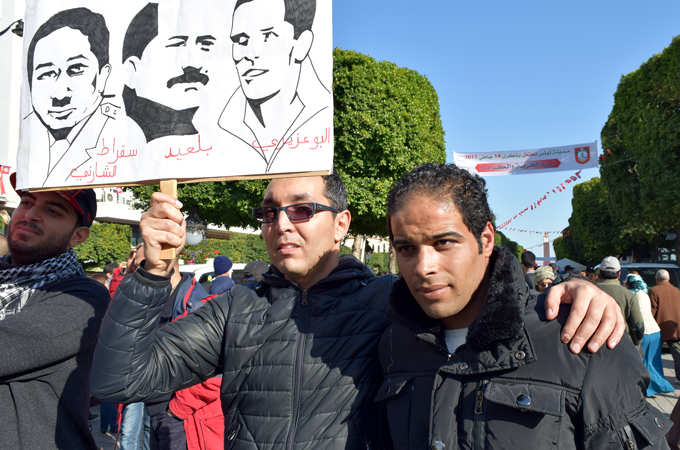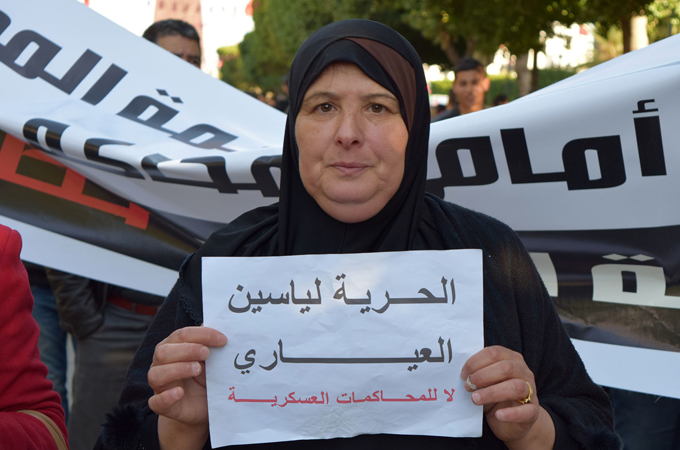‘They are doing the same things as Ben Ali’
Four years on, impunity remains a serious issue in post-revolutionary Tunisia.

Tunis – Thousands of Tunisians poured into Habib Bourguiba Avenue, the capital’s main thoroughfare, on Wednesday to mark the fourth anniversary of toppling former President Zine El Abidine Ben Ali, an act that unleashed a tide of popular revolt across the Arab world.
This was meant to be a day of national pride but the street celebrations concealed a more painful reality; a growing sense of frustration over a revolution that has yet to deliver on basic demands. “Work, Freedom and National Dignity”, the same motto that encapsulated the Tunisian revolution’s agenda, could still be heard today.
RELATED: Tunisia transitional justice faces obstacles
Marches evoked both the gains and setbacks of the post-revolutionary era.
In the morning, several families of the revolution’s victims (both dead and wounded) staged a peaceful march titled: “We will not abdicate” in front of the National Theatre of Tunisia on Bourguiba Avenue.
Several families said they boycotted a ceremony held at the Carthage presidential palace. That ceremony was later interrupted by protests staged by the families of the victims forcing Tunisia’s newly elected President Beji Caid Essebsi to end the ceremony as families denounced it as a “masquerade”.
“We were humiliated,” said Arabia Jnachi, wife of a Tunisian killed during the uprising. Protesters criticised Essebsi’s decision to honour only the victims of high-profile political assassinations.
 |
| Anouar Benjaddou, right, was wounded in the revolution [Adeline Bailleul/Al Jazeera] |
For many protesters, this came as no surprise. “They tried to divide us. They invited some families of the martyrs of the revolution and left the wounded behind. The poorest and most disadvantaged were convinced by their political rhetoric,” explained Anouar Benjaddou, one of the people wounded during the uprising.
Several protesters accused President Essebsi of being “responsible for the impunity of those who killed the martyrs”. Several protesters carried placards that read: “Snipers are a rumour” in reference to Essebsi’s own public speeches in 2011 in which he denied the existence of snipers during the uprising.
Sitting outside a street cafe along Bourguiba Avenue, the grim faces of the victims’ families contrasted with the surrounding celebratory atmosphere. “We are regarded as less than dogs,” Yosri Zrelli said. Yorsi has undergone 26 surgeries since the uprising.
We demand liberty, dignity, justice and compensations for families of the martyrs and the wounded of the revolution. We demand that those who shot us and killed our friends and brothers to be punished.
“Where are the martyrs’ rights?” asked a mother of a victim in the crowd. Police investigations failed to turn up any results about her son’s death, a story not uncommon among families of the revolution’s martyrs.
“We demand liberty, dignity, justice and compensations for families of the martyrs and the wounded of the revolution. We demand that those who shot us and killed our friends and brothers be punished,” Benjaddou added.
Last April, after three years of deliberations, the Tunisian military court announced its verdict in three trials against deposed President Ben Ali and some of the former regime’s senior ranking officers.
Most sentences did not exceed three years in prison, including time already served. Other sentences led to dropping the charges altogether, with the exception of Ben Ali, who was sentenced to life in prison.
Four years on, impunity remains a serious issue in post-revolutionary Tunisia.
During the day, other protests called for the freedom of blogger Yassine al-Ayari who was recently convicted in absentia by a military court for three years on charges of defaming the army and insulting the military high command.
The charges were based on Ayari’s Facebook posts back in August and September that were critical of Tunisia’s defence minister for refusing to appoint a new head for military intelligence and for weakening military institutions.
A case that has alarmed human rights campaigners and sparked fears for freedom of speech under Essebsi’s reign.
Saida al-Ayari, the blogger’s mother, was among the protesters on Bourguiba Avenue. She said she feared the return of a new era of dictatorship in Tunisia.
 |
| Saïda al-Ayari, mother of blogger Yassine al-Ayari calls for his freedom [Adeline Bailleul/Al Jazeera] |
“Today, I’m feeling sad for the revolution because nothing has changed in four years. We revolted for freedom of speech but they are now charging my son because he expressed himself. They are doing the exact same thing as Ben Ali did. We are at the same level,” she told Al Jazeera while carrying a placard that read: “Freedom for Yassine al-Ayari, no to military courts.”
In recent months, Ayari had published blogs critical of the Nidaa Tounes party, which won Tunisia’s first-post revolution parliamentary elections last October.
“Those who killed protesters during the revolution did not even get this kind of sentence,” said Saida, a widow of Yassine’s father, Taher, who was shot dead in May 2011 by a radical Islamist group.
Although January 14 marks a day of Tunisian unity, the harsh tones on the streets reflected a rising sense of resentment among citizens.
“Beji Caid Essebsi was prime minister at the time my husband died while fighting against terrorism, he did not even hold a proper funeral in his honour and now they are asking me to attend a masquerade to keep me silent about my son.”